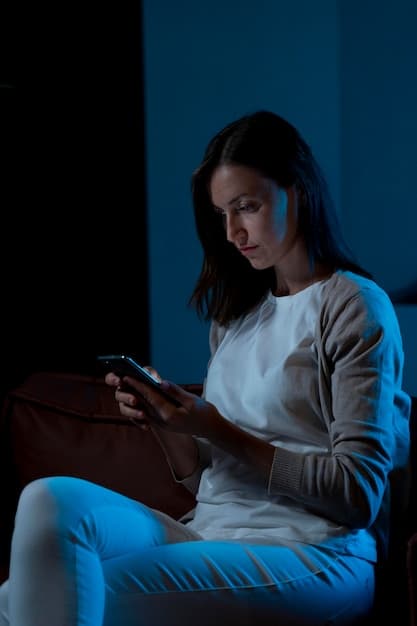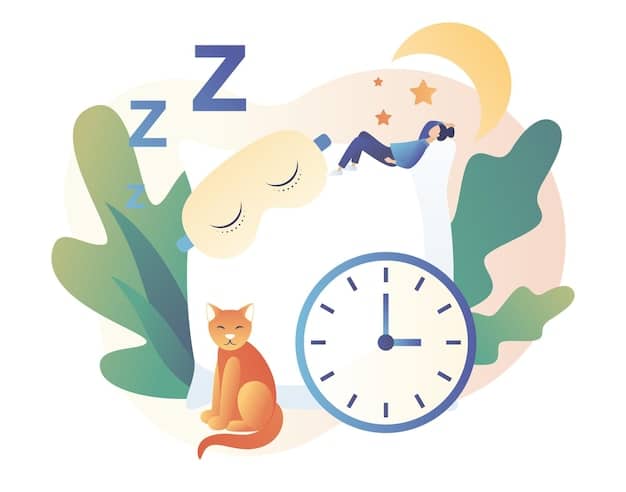Blue Light After 8 PM: New Study Reveals Mental Health Impact

New study reveals that exposure to blue light after 8 PM can significantly impact mental health, disrupting sleep patterns and potentially increasing the risk of mood disorders.
In today’s digital age, we’re constantly surrounded by screens, but a new study shines a light on how blue light exposure after 8 PM affects your mental health, revealing potentially harmful consequences for our well-being.
Understanding Blue Light and Its Sources
Blue light is a high-energy visible light emitted by various sources, both natural and artificial. Understanding these sources is the first step in recognizing and mitigating potential risks.
Key sources of blue light include:
Natural Blue Light
- Sunlight: The most significant source of blue light, essential for regulating our circadian rhythm during the day.
Artificial Blue Light
- LED Screens: Found in smartphones, tablets, computers, and TVs.
- Fluorescent and LED Lighting: Common in homes and offices.
While blue light from the sun is crucial for alertness and mood during the day, excessive exposure from screens, particularly in the evening, can disrupt our natural sleep-wake cycle, setting the stage for potential mental health issues.
The Circadian Rhythm and Blue Light’s Impact
Our circadian rhythm, often called the body’s internal clock, is a natural, internal process that regulates the sleep-wake cycle and repeats roughly every 24 hours. Blue light can significantly interfere with this process.
Here’s how blue light affects the circadian rhythm:
- Suppression of Melatonin: Blue light inhibits the production of melatonin, a hormone that promotes sleep.
- Delayed Sleep Onset: Exposure to blue light in the evening can trick the brain into thinking it’s still daytime, making it harder to fall asleep.
- Disrupted Sleep Patterns: Irregular sleep patterns can lead to chronic sleep deprivation, affecting mental health.

Understanding the relationship between blue light, melatonin, and your circadian rhythm is crucial for maintaining healthy sleep habits and preventing adverse effects on mental well-being.
New Study Findings: Blue Light and Mental Health
A recent study has shed new light on the direct correlation between blue light exposure after 8 PM and various mental health concerns. Let’s delve into the specific findings.
The study reveals:
- Increased Risk of Depression: Exposure to blue light at night is associated with a higher risk of depressive symptoms.
- Higher Anxiety Levels: Participants exposed to blue light reported increased feelings of anxiety and stress.
- Mood Disorders: Disrupted sleep patterns due to blue light can trigger or worsen existing mood disorders.
Study Methodology
The study involved a diverse group of participants who were monitored for their blue light exposure and mental health status over a period of several weeks. The results consistently showed a negative impact of evening blue light on mood and sleep quality.
These findings underscore the importance of mitigating blue light exposure in the evening and adopting healthier screen habits.
Practical Tips to Reduce Blue Light Exposure
Reducing blue light exposure, especially after 8 PM, is crucial for maintaining mental health. Here are some practical tips to help you minimize its harmful effects:
- Use Blue Light Filters: Install blue light filter apps on your devices or enable built-in settings like Night Shift on iOS or Night Mode on Android.
- Invest in Blue Light Blocking Glasses: Wear these glasses in the evening to filter out blue light from screens and artificial lights.
- Limit Screen Time: Reduce or eliminate screen time at least one to two hours before bed.
Create a Screen-Free Evening Routine
Engage in relaxing activities that don’t involve screens, such as reading a physical book, listening to calming music, or practicing mindfulness exercises.

By implementing these strategies, you can significantly reduce your exposure to blue light and promote better sleep and improved mental well-being.
The Long-Term Effects of Blue Light on Mental Health
The long-term effects of chronic blue light exposure can be significant, leading to a range of mental health issues. It’s essential to understand these potential consequences to make informed decisions about screen habits.
Potential long-term effects include:
- Chronic Sleep Disorders: Persistent disruption of the circadian rhythm can lead to insomnia and other chronic sleep problems.
- Increased Risk of Mental Illnesses: Studies suggest a link between long-term blue light exposure and a higher risk of depression, anxiety disorders, and bipolar disorder.
- Cognitive Impairment: Lack of quality sleep due to blue light can impair cognitive functions, such as memory, concentration, and decision-making.
Preventative Measures
Taking proactive steps to reduce blue light exposure and prioritize sleep hygiene can help mitigate these long-term risks and support overall mental well-being.
In conclusion, understanding and addressing the impact of blue light on mental health is more important than ever in our digitally driven world.
Creating a Healthy Sleep Environment
In addition to reducing blue light exposure, creating a healthy sleep environment is essential for promoting restful sleep and protecting your mental health. Here are some key elements to consider:
- Optimize Your Bedroom: Ensure your bedroom is dark, quiet, and cool. Use blackout curtains, earplugs, or a white noise machine to minimize disturbances.
- Maintain a Consistent Sleep Schedule: Go to bed and wake up at the same time every day, even on weekends, to regulate your circadian rhythm.
- Establish a Relaxing Bedtime Routine: Engage in calming activities before bed, such as taking a warm bath, practicing deep breathing exercises, or reading a book.
Avoid Stimulants Before Bed
Avoid caffeine, alcohol, and heavy meals close to bedtime, as these can interfere with your ability to fall asleep and stay asleep.
| Key Point | Brief Description |
|---|---|
| 💡 Blue Light Impact | Exposure after 8 PM can disrupt sleep and affect mental health. |
| 🌙 Melatonin Suppression | Blue light inhibits melatonin, delaying sleep onset. |
| 🛡️ Protection Tips | Use blue light filters, glasses, and limit screen time. |
| 😴 Sleep Environment | Optimize your bedroom for darkness, quiet, and coolness. |
Frequently Asked Questions (FAQ)
▼
Blue light is a high-energy, short-wavelength light present in sunlight and emitted by digital screens. While essential during the day, evening exposure can disrupt sleep.
▼
Blue light suppresses melatonin production, a hormone that regulates sleep. This makes it harder to fall asleep and can disrupt your natural sleep-wake cycle.
▼
Blue light filters are apps or settings on devices that reduce the amount of blue light emitted. They help minimize the impact on your sleep and mental health.
▼
Yes, blue light blocking glasses can filter out a significant amount of blue light, especially helpful in the evening. They help reduce eye strain and improve sleep quality.
▼
Chronic blue light exposure has been linked to sleep disorders, increased risk of mental illnesses like depression and anxiety, and cognitive impairment over time.
Conclusion
By understanding the impact of blue light exposure after 8 PM and implementing practical strategies to reduce it, you can significantly improve your sleep, protect your mental health, and enhance your overall well-being. Prioritize creating a healthy sleep environment and be mindful of your screen habits in the evening hours.





